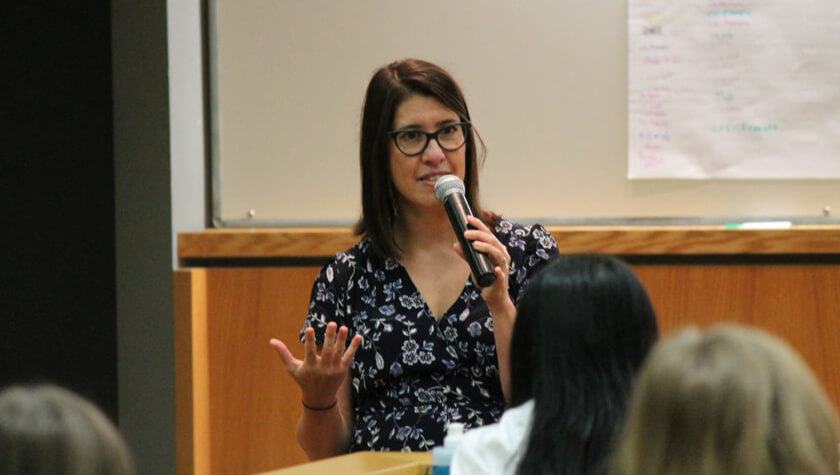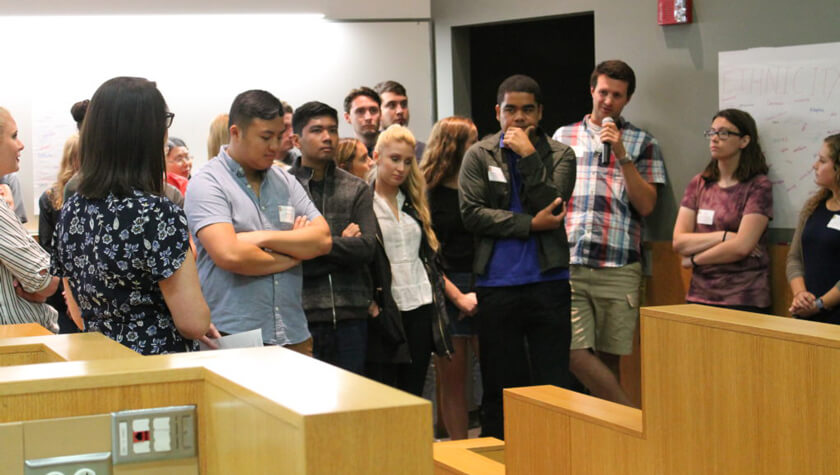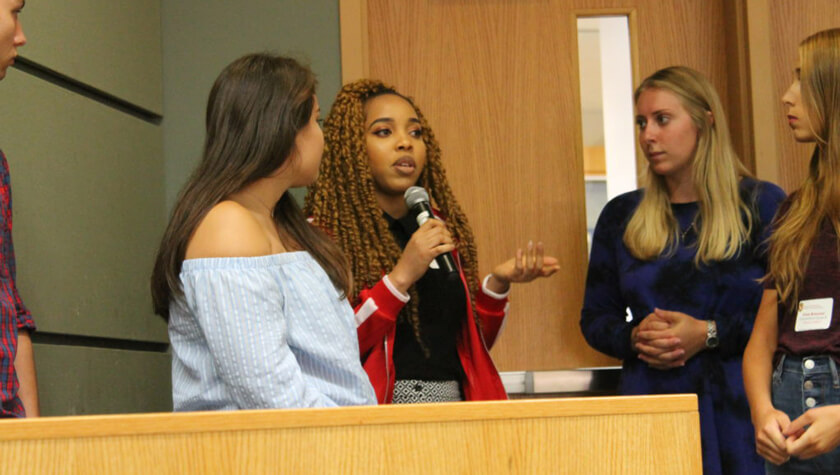Through new strategic plan initiatives and an added leadership position, the School is enhancing efforts to educate inclusive pharmacists
By Katie Gerhards
When Dean Steve Swanson and other leaders at the University of Wisconsin–Madison School of Pharmacy were laying out their vision for the School’s next six years, they saw an opportunity to change outcomes for faculty, staff, students — and even future patients.
Within the three overarching goals of the School’s new strategic plan — innovate, cultivate, and educate — they interwove themes of diversity, inclusion, and equity.
“Diversity is core to pharmacists’ mission to serve every patient and care for all populations. We want the UW–Madison School of Pharmacy to be a leader in producing inclusive practitioners and scientists who will improve health for everyone,” says Dean Swanson. “We have a responsibility to help increase diversity in the pharmacy profession and transform health care.”
To make these goals a reality, they created a new leadership position devoted to developing diversity initiatives around both recruitment and retention. Goals include stronger efforts to recruit underrepresented faculty, staff, and students, and plans for retention by fostering community, inclusion, and equity. In July 2019, Lisa Imhoff joined the School of Pharmacy as assistant dean for Diversity and Inclusion Initiatives.
Imhoff, who has seen patients as a counselor for 16 years and holds a master’s degree from UW–Madison in social work, comes to the School from UW–Madison’s University Health Services (UHS), where she was a mental health provider, coordinator of substance abuse services, and chaired two equity and diversity committees. At UHS, she helped reshape the diversity statement of the organization as well as policies and procedures that impacted the care that underrepresented students received. Additionally, she advocated for the needs of staff with marginalized identities, both through recruitment and retention initiatives.
“Diversity is core to pharmacists’ mission to serve every patient and care for all populations.” –Dean Steve Swanson
“Our patient populations are becoming increasingly diverse, and if we want patient-centered care, then we need health care providers and researchers to appreciate and recognize the opportunities of diversity,” she says.
At the School, she’s looking forward to creating initiatives and programming for faculty, staff, and students in all divisions and degree programs to foster teamwork and improve health care by understanding how patients’ intersectional identities shape perceptions and experiences.
“For pharmacists or researchers, understanding a patient’s culture or history can influence why they might be reluctant to take medication, which gives you more entry points to help them become engaged in their own health and improve their outcomes,” she says.
Advancing health care
Including several inclusivity-based goals — such as increasing underrepresented faculty, staff, and students and preparing all students to serve marginalized populations — in the strategic plan reflect the School’s ongoing commitment to educating and cultivating the pioneering minds at the heart of health care.
“Although diversity and inclusion have been an emphasis within the School for PharmD students, the reconfigured strategic plan places it front and center from an education perspective,” says Professor Mel de Villiers, vice dean and associate dean for academic affairs. “The hope is that these initiatives will further empower students to transform health care.”

The country’s growing racial and ethnic diversity and heightened national focus on issues surrounding gender and sexual identity represent the evolving patient population. And encouraging diversity and inclusion in pharmacy education will advance providers’ and researchers’ abilities to connect with and understand patients, which can make a huge impact on health outcomes and reduce disparities.
“Including diversity and inclusion as a priority in our strategic plan is essential to making our other goals operational,” says Professor Ron Burnette, associate dean for faculty affairs.
When it comes to discovering new and better ways to treat patients, research questions need to consider the nuanced needs of different genders, races, cultures, and socioeconomic groups. By making research and practice reflect a breadth of patients’ needs, the School will be able to more effectively deliver strategic initiatives, such as advancing personalized pharmacy, creating new practices to improve patient outcomes, and identifying new areas of research.
“Diversity and inclusive behaviors impact the services we’re providing and impact the engagement of our students and patients,” says Imhoff. “If we want to be effective and decrease health disparities, we have to understand this.”
Eva Vivian, a professor in the School’s Pharmacy Practice Division who works with under-resourced communities to improve health outcomes, says pharmacists who are comfortable working with patients from a variety of ethnic, religious, and cultural backgrounds are the most productive — and the most in-demand.
“As our patient base becomes increasingly multicultural, pharmacists must become more proficient at addressing patients’ cultural, informational, and linguistic needs, along with improving access to care and preventive services,” says Vivian.
Fostering inclusivity and equity
One of Imhoff’s first priorities is to create definitions for diversity, inclusion, equity, and other terms to reflect the School’s values and provide a shared language that will build the capacity for effective conversations.
“Lisa has hit the ground running and has been speaking with all the vested parties, including faculty, staff, and students, to get to know them and the issues that are important to them and the School,” says Burnette.
Through conversations with stakeholders and leadership in the School, Imhoff will be creating a diversity and inclusion-focused strategic plan, laying out specific priorities and actionable items to engage everyone in the School in fostering an inclusive atmosphere.

“Given Lisa’s background in social work, we’re excited for her to bring a different, yet complementary, perspective to patient care that enhances our interprofessional education initiatives,” says Associate Professor Karen Kopacek, associate dean of student and academic affairs. “Her guidance will also be important in the school-wide wellness program to ensure future programming encourages participation by all members in the School community.”
By speaking with people across the School, Imhoff is gaining an understanding of where the gaps are, and how her work can fill them in. For example, she can create trainings or share resources to reach individuals at all levels of understanding.
As the cornerstone of growth in this area, she strives to help faculty, staff, and students recognize their own intersectional identities and how they might overlap with or differ from peers’. If we don’t understand ourselves, it’s harder to understand others, she says.
“We think about ethnic identity, sexual identity, class identity, ability identity — there are so many aspects that inform the way we move through the world and interact with others,” Imhoff says. “If we aren’t aware of our own selves, we can’t be aware of others, and if we aren’t aware of others, we’re more likely to unintentionally exclude them.”
Also, when we understand ourselves, we can identify our different points of privilege and how we may have greater access to systems that help advance us, while others may not.
“If you empower faculty, staff, and future practitioners to be engaged in their own knowledge of diversity and inclusion, they can help model that for other people,” she says. “It’s a bidirectional process. You can really empower the people you’re serving and working with.”
Initiatives in education
To kick off her first semester at the School, Imhoff held seminars for all incoming students during their program orientation to introduce these ideas and to help students begin sorting through their own identities.
During orientation for the PharmD Class of 2023, she first had the students define what community means to them, and then brainstorm ways to be intentional about building community. In a later exercise, the students broke into groups based on racial, gender, ethnic, socioeconomic, or other identity. The students could choose which part of themselves they identified most strongly with, while recognizing that some identities are fluid concepts that can change with environment, age, and priorities.

“Whether they’re first-generation students, students of color, or other marginalized identities, we want them to feel represented, welcome, and like the UW–Madison School of Pharmacy is a place they want to be,” Imhoff says.
She will be revisiting these topics through lectures in the PharmD program’s Professional Development and Engagement course, which has sessions devoted to attitudes, biases, and beliefs.
“The Dean has positioned Lisa to have influence at the very top,” says Burnette. “For initiatives like this to succeed, they need to be valued from leadership and administration. I’m encouraged by the willingness by the Dean and all leadership to have the difficult conversations that will push the School forward.”
Imhoff will be building on the School’s ongoing diversity and inclusion work, including the Pharmacy Summer Program, which is an immersive five-day pharmacy school experience, with a focus on introducing pharmacy to underrepresented high school students. The summer program continues to be held annually, organized by the School’s Recruitment and Admissions team.
She hopes to extend the idea of the Pharmacy Summer Program to get the pharmacy profession in front of younger eyes, even as early as elementary school. “If you don’t have a concept of who pharmacists are or you don’t interact with one until later in life, you might not be directed to the sciences,” she says.
In another strategy, Imhoff hopes to leverage existing resources to reach out to disenfranchised youth and underrepresented minorities and encourage them to pursue careers in pharmacy and research. One way is by promoting the Badger Promise, which offers two or four semesters of free tuition and segregated fees to Wisconsin first-generation college students transferring from certain schools.
“The hope is that these initiatives will further empower students to transform health care.” –Mel de Villiers
The School also offered a series of interprofessional “lunch and learns” on topics surrounding diversity, which are open to all faculty, staff, and students in the health sciences. Imhoff is continuing to support the series and has organized an October session about provider bias in health care and how being aware of biases can reduce their effects.
“Our vision is that diversity and inclusion at the School of Pharmacy will continue to cultivate human capital by enhancing the skills of individuals and our ability to use diversity as a driver of excellence,” says de Villiers. “Ultimately, these efforts will contribute to growing a diverse and culturally prepared pharmacy workforce.”
Building inclusive communities and educating a diverse body of practitioners prepared to meet the needs of all patient populations is a continuous commitment, but Imhoff and the School of Pharmacy community are prepared — and excited — for the challenge.
Read about efforts within the School of Pharmacy aimed at increasing health equity, including a new option in the PharmD program with a focus on rural health and community-focused programs to prevent and manage diabetes: Peers Empowering Peers and Peers LEAD.